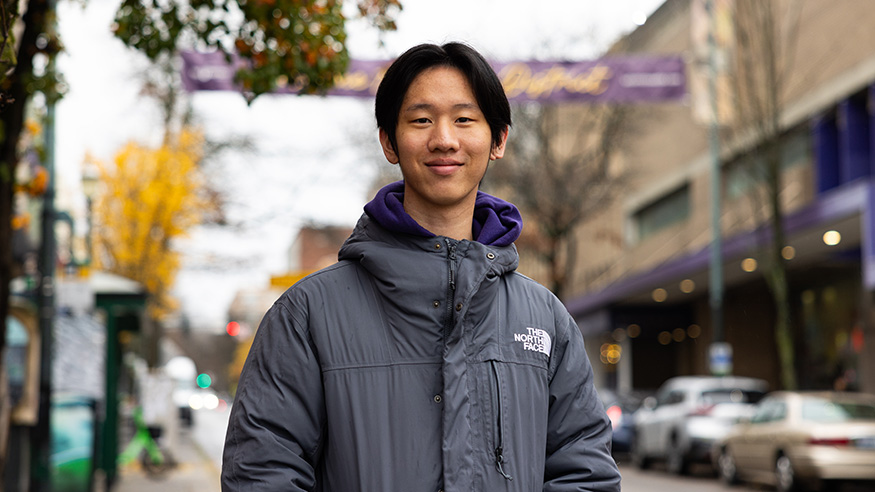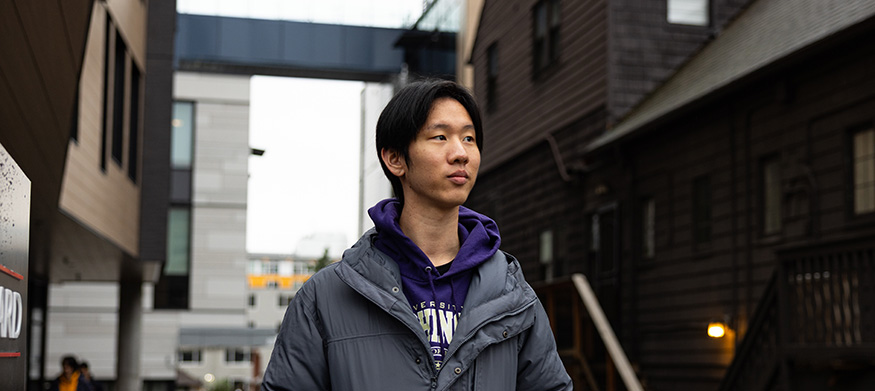
From Phoenix to Honduras to Dublin, individuals or corporations are buying large swaths of land to create private communities. Some communities are motivated by a libertarian distaste for government interference. Others are pet projects of wealthy entrepreneurs with specific agendas or funded by corporations to attract tech workers.
UW undergraduate Edwin Bai researched a dozen of these communities — which he refers to as “libertarian tech zones” — through the Gerald W. Halmo Geography Scholars Program in the UW Department of Geography. He wanted to understand why these communities were created, how they function, and how they impact the surrounding area.
“The original goal of the project was to investigate libertarian tech zones across the world, but as the project continued, the goal broadened to encapsulate the harms of gentrification caused by these zones,” says Edwin, whose interest in social issues led him to major in geography, choosing the geography with data science option, and minor in urban design and planning.
The Complications of Libertarian Tech Zones
Edwin conducted his libertarian tech zone research as part of the Department of Geography’s Anti-Eviction Lab, led by Erin McElroy, assistant professor of geography. A few of the libertarian tech zone projects he researched have been realized; many others have stalled due to formidable roadblocks. Some examples:
- The Seasteading Institute (TSI) aims to build autonomous mobile communities on seaborne platforms in international waters, immune to any individual country’s laws and regulations. Plans to construct a floating city in French Polynesian waters fell through, and TSI is now searching for a new host country.
- In Honduras, Prospera LLC purchased 58 acres for a “zone for employment and economic development,” or ZEDE, which promised low taxes, no social security, and the adoption of cryptocurrency as legal tender. The country’s right-wing government legalized ZEDEs in the hope that they would lead to economic growth, but the Honduran Supreme Court has since ruled ZEDEs to be unconstitutional. As a result, most of Prospera’s buildings are vacant.
You could think of them as cities that aren't necessarily held accountable to the public and the government, which raises ethical concerns about surveillance, micromanagement, and power dynamics.
- Bill Gates purchased 24,800 acres west of Phoenix, Arizona, hoping to build Belmont, a “smart city” that uses cutting-edge technology to provide affordable housing, public transit, renewable energy, and autonomous vehicles. The project is stalled until a long-term source of water can be identified.
- Elon Musk has two libertarian tech cities planned in Texas, intended as company towns to house employees of Hyperloop and SpaceX. Residence is tied to employment, with fired staff required to leave in 30 days. Coupled with recent mass layoffs in tech companies, that has created a volatile environment in which residents have no long-term housing security.
“A big pattern in all of these libertarian tech cities is that they’re pushed forth by a private organization,” says Edwin. “They take the libertarian idea of low government regulation to the maximum by putting ownership of the land and the people living there under the control of corporations rather than government agencies. You could think of them as cities that aren't necessarily held accountable to the public and the government, which raises ethical concerns about surveillance, micromanagement, and power dynamics.”
Two Sides of Tech Zones
Edwin also looked at tech zones within existing cities, designed to attract technology companies and skilled employees. The Silicon Docks project in Dublin leveraged Ireland’s low corporate tax rate to create a concentration of large tech companies around Dublin’s Grand Canal Dock. San Francisco’s Twitter Tax Break Zone, in the city’s mid-Market neighborhood, enticed companies to relocate there by waiving payroll taxes in that zone for six years.
Both of those zones have suffered setbacks in recent years. The Silicon Docks project attracted well-paid tech workers to Dublin, but the resulting rent increases led to a housing crisis. As a result, many tech firms relocated to other parts of Ireland with a lower cost of living. San Francisco’s Twitter Tax Break Zone was hit with a double whammy — COVID and the end of the payroll tax break. The area now struggles with high vacancy rates.
“When corporations come into a poor area and buy and redevelop property in a way that suits them, they bring something to the neighborhood they move into, but they also take something in the process,” he says. “The redevelopment brings in additional tech workers, which leads to a demand for luxury housing and a loss of affordable housing. That causes a rise in homelessness and leads to homogeneity of communities that had been diverse and working-class. We’ve seen this in both San Francsico and Dublin, and even in Seattle. And while some of these tech companies promise to invest in the community, those promises always fall flat.”
Hands-on Help for the Unhoused
Edwin’s libertarian tech zone research touched on housing insecurity, but homelessness is more central to other projects he’s taken on. As an officer in Huskies for Housing, a UW registered student organization that provides assistance to unhoused communities around Seattle’s University District, Edwin leads a food donation program. Partnering with local businesses, the program provides food donations to two local unhoused encampments, Tent City 3 and Nickelsville Northlake.

And continuing his work with McElroy, Edwin has been recording oral histories of individuals living in an unhoused encampment known as Tent City 3. “I interview people about their experiences with being evicted, to understand what their life process was leading up to their eventual eviction,” Edwin says. “The project is meant to give the public a better understanding of how people experience homelessness.”
Having completed more than a dozen 45-minute interviews, Edwin now has a more visceral understanding of housing precarity. That background will be helpful in his next chapter, which he hopes will be graduate studies in urban planning.
“Those interviews have shown me that one or two mistakes can absolutely ruin your life,” Edwin says. “I don’t know how many times I’ve heard people say that they got a divorce and their life fell to pieces. For so many people, that’s all it took. Hearing people’s stories has been really eye-opening.”
More Stories

A Love of Classics and Ballroom
Michael Seguin studied Classics at the UW and now owns Baltimore's Mobtown Ballroom. The two interests, he says, are more connected than they might seem.

Bringing Music to Life Through Audio Engineering
UW School of Music alum Andrea Roberts, an audio engineer, has worked with recording artists in a wide range of genres — including Beyoncé.

A Sports Obsession Inspires a Career
Thuc Nhi Nguyen got her start the UW Daily. Now she's a sports reporter for Los Angeles Times, writing about the Lakers and the Olympics.
